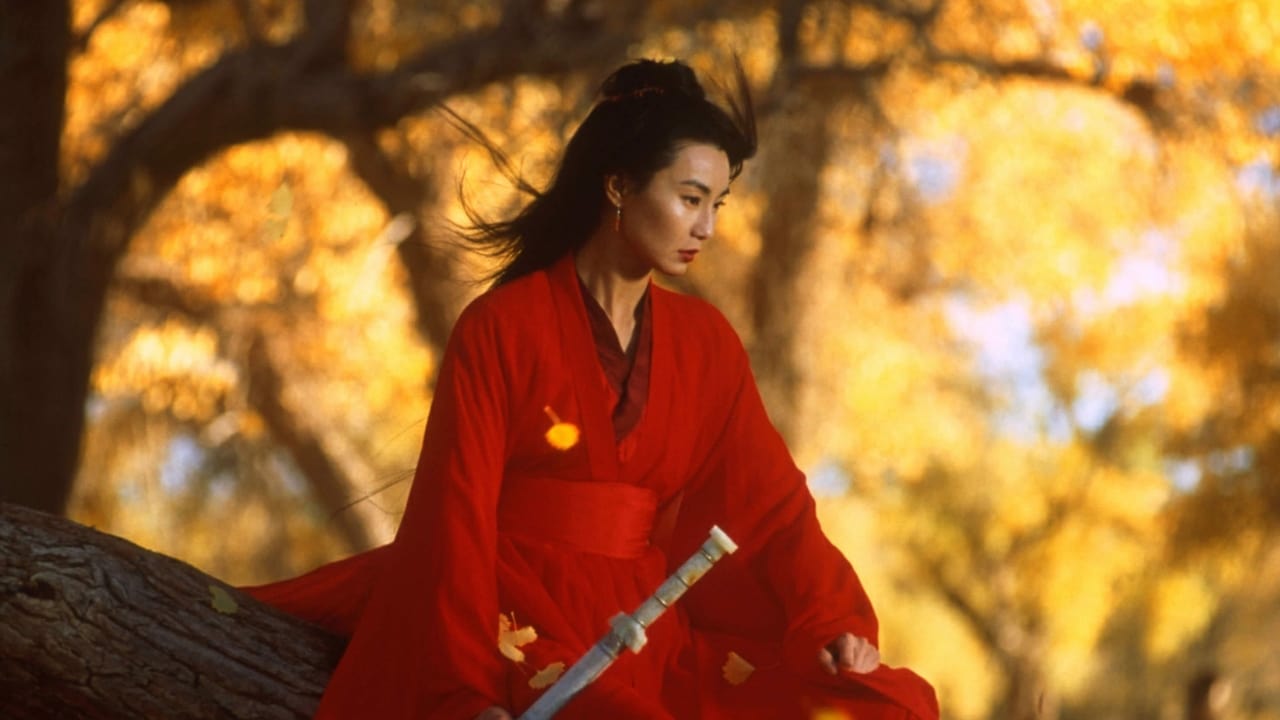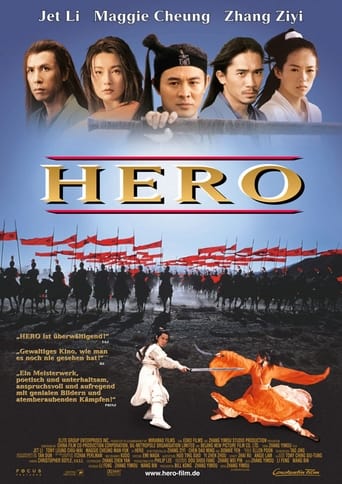

Brilliant and touching
... View MoreThere is just so much movie here. For some it may be too much. But in the same secretly sarcastic way most telemarketers say the phrase, the title of this one is particularly apt.
... View MoreThe acting is good, and the firecracker script has some excellent ideas.
... View MoreStrong acting helps the film overcome an uncertain premise and create characters that hold our attention absolutely.
... View MoreI certainly disagree with the message. I understand that this is a telling of how China came to be by "uniting" the different kingdoms but it, possibly inadvertently, sends the message that war and conquer are good. The king is a ruthless man who will do anything to achieve his goals of bringing the different kingdoms together. This includes the killing of many individuals. Sometimes war is necessary. To protect. But never to conquer. We should all be united, but not in the way this film presents. We can live separately yet together in peace. The different kingdoms could have thrived separately but this king was willing to kill so that they would all be forced under one rule. Not because the others were dealing with injustice or the like but because that's just how he wanted it. So while the film is obviously stunning visually - the choreography, the use of color, lighting, etc. it all ultimately fails in its portrayal as the message is not one that deserves to be uplifted. It's a great film for its endeavors but ultimately shameful in what it's trying to tell us. Allowing the king to succeed may have stopped the killing but he started it to begin with and this choice undoes the entire sacrifice of nameless and the two lovers and their pain.
... View MoreIt's really good, but you should try not to view it with the expectation of conventional film making, despite the time tested method of storytelling. Watching this film for the second time recently, someone I was with remarked that this film resembles a sort of Greek tragedy. I think that's actually a really good way to contextualize this film. The way this film is written and presented is more evocative of ancient methods of storytelling which precede traditional film. I'm not really referring to the way the way the characters speak to each other necessarily, nor the predictability of the narrative (though in fairness, the narrative isn't super hard to follow or even predict). The methods I'm referring to run more along the lines of storytelling by the characters, exaggerated supernatural ability of the characters, and the clear sense of morality and ideology by both the characters and, it seems, Yimou Zhang. The writing of this film reminds me more of Homer's Odyssey than a kung fu movie. Speaking of Homer, the characters in this film are presented in the action scenes as being superhuman in skill and ability. This is done, of course, via beautifully choreographed wire fu. These scenes are plentiful in the film and greatly accentuate the poetic nature of the story. I should clarify though, for the most part the action in this film is meant to express emotions that have very little to do with tension. They're not typical movie fights. The point is not to wonder what will happen or who will win, but rather to understand the emotions and motivations of the characters through a sort of elaborate dance. If you understand the nature of the story and how the action compliments it, then you will see its true value. The common complaint I hear concerning this film is that its somewhat shallow. I would actually agree with that, in a way. This film doesn't really ask any difficult questions, and I can't imagine any intelligent audience would find it especially challenging on an emotional level. While I do admire the relatively unique method of story telling, so far as the context of the film medium is concerned, I can't say it lends itself too well to the type of moral quandaries or meditations which are characteristic of great films. It's akin to a children's film. The observations and themes it presents are things which are just common knowledge for anyone older than 12. That's not to say it's bad. This is a very good film. Bear in mind though, that your emotional resonance with it might not amount to much. It's a visual feast, and a love letter to historical storytelling. Check it out, but don't come with too many expectations of a conventional film.
... View MoreI really did enjoy this movie. The cinematography was sublime and kept the movie in it's entirety from being a flop. The story line was a little bit of a stretch for me, interesting, but a little over the top. However, the cinematography is what really made the watching experience so enjoyable. The directors use of varying angles, speeds, and lighting adds that little bit of oomph to the film. Vibrant colours, extreme close ups, and slow motion scenes seem to be at the center. The director executes the filming techniques in such a way that they add so much more to the film and he does a good job of making sure they don't detract. All in all - I'd recommend this film to somebody who enjoys good cinematography, but I wouldn't recommend it for the story.
... View MoreHero is concerned not only with physical prowess and ability, but also the battles that occur within the mind. The entire film then takes place solely within the confines of the king of Qin's palace, and they are trading stories, not blows. Like in Rashomon, they are fighting for their own version of the story, attempting to gain an upper hand in the proceedings. And within these stories there are also mental battles; Long Sky and Nameless' initial clash is in their imagination, a vicious one-on-one muted in grey-scale. They are like chess grandmasters, with each blow calculated and bringing infinite possibilities and outcomes, so that the fight is over before it has begun. Their mastery of the art of swordfighting makes this possible. The choreography of Hero is in the wuxia style, which has been codified over time so that Western audiences may also come to appreciate and know its art. Masters of the style float over long distances as if they are suspended by strings, barely needing to touch the ground before they gracefully float away again (affectionately dubbed 'wire-fu'). When they fight their movements are so ferociously fluid that they whip up leaves into tornadoes, which curl around the characters themselves. Zhang Yimou is concerned with form as much as he is with function; Flying Snow does not merely repel, but dances amongst the rain of arrows, and the writers inside are painting with ink as red as blood, also fiercely devoted to their craft. Consider this: Broken Sword derives his mastery of swordplay from the strokes of his calligraphy. Or is it the other way around?The prominent art of Christopher Doyle is also on display. He begins with an initial dreary grey, a drabness to the present day story. This allows for the sharp contrast of the stories the two men tell, which are each punctuated strongly with their own colour code. There are a many number of possibilities and interpretations here. I was shocked by the vividness of the red ink, and its likeness to the blood shed by the diligent students of calligraphy. In the demonstration of the 10 pace killing technique Doyle and Yimou find beauty and tranquility in the cool blues, the apt slow motion, the little dink of the sound design as the cup lands on the sword. The blade is shown to be as ferocious as it is gentle. Robed in white, he reveals a purer technique, a strike of such surgical precision magnified in the shallow focus and slow motion. Yimou uses the latter well, cutting judiciously from serenity to furious motion, assuming the perspective of these masters who move and see at a different speed level. They whip their blades which such strength that they the metal bends and groans to their touch.The king tells his story with such passion and understanding. In his version, Flying Snow and Broken Sword are lovers so desperate to take the fall for each other they must resort to fighting for that honour. It is a tragic love story, more so than the apparent truth. This also points to the king's understanding of the nature of sacrifice; he is able to imagine the sorrow and grief of a sword twisted just enough to wound but not to kill, and that sword being beaten to save the life of another. So he is also able to recognise the greatest sacrifice of them all, and that sometimes the greatest warrior is the one who lays down their sword. So in the end it is indeed tranquility that wins out.
... View More